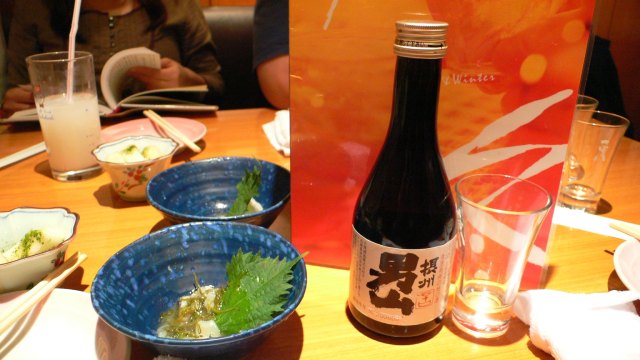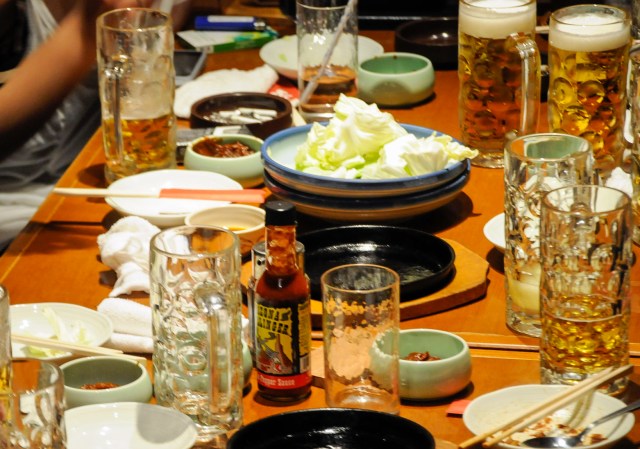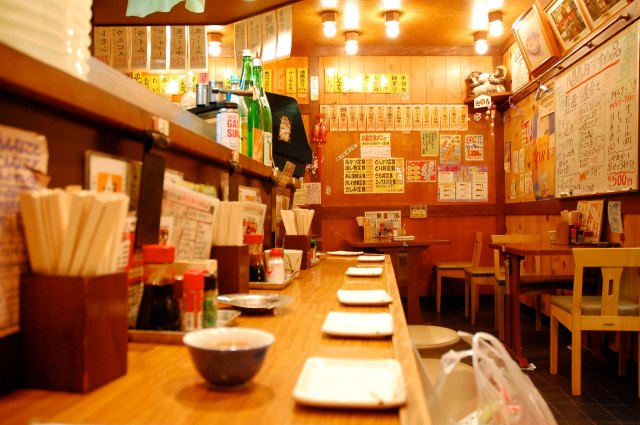
Japanese restaurant worker says there’s a better system that diners should use.
With so many different customs and rules of etiquette in Japan, it can be difficult for both foreigners and locals alike to know what the correct protocol is in various situations.
Over the years, we’ve learnt to not laugh loudly at the cinema and avoid stepping on the threshold of a Japanese room, but now it appears there’s another thing we should refrain from doing, and this time it involves dining out at the izakaya.
Izakaya are tavern-like restaurants that can be found throughout Japan, and given their casual vibe and jovial atmosphere, you’d be forgiven for thinking they’re one of the few places where people can kick back and relax without having to worry about etiquette.
However, according to izakaya worker and one half of the comic duo “Westland”, Hiroyuki Iguchi, there’s something that people should be aware of when eating out at these taverns.
Iguchi, who’s been working at an izakaya for over ten years, says a lot of customers stack their plates on the table at the end of their meal. Izakaya typically serve a variety of share plates and small bites for diners to consume while drinking, so each table can fill up with a lot of plates as people graze throughout the meal.
While stacking plates for waitstaff when you’ve finished eating might feel like a courteous gesture, Iguchi says it isn’t helpful at all. In fact, he views it as more of a hindrance than a help because a lot of diners stack the plates without thinking about things carefully, and he’s come across some crazy things, like people sandwiching little soy sauce plates filled with soy sauce in the middle of a tower of dishes.
When it’s loaded high like this, extra care must be taken to either dismantle the tower or transport it from table to kitchen so that the small soy sauce dishes don’t spill. Plus, when oily plates are layered on top of each other, it actually increases the time and effort required for washing, as both the top and bottom of the dish become soiled.
So if stacking plates at the end of the meal is a waste of everyone’s time and effort, what should diners do about the plate situation? Iguchi says the best way to deal with finished dishes is to have them taken away one by one as they become empty.
He goes on to mention that it’s ideal to have only one or two dishes on the table at a time, which means ordering only a couple of things as you go, rather than a whole lot of things together.
People in Japan had a lot to say about the issue, with comments like:
“Isn’t it common sense to leave dishes with liquid still in them at the top of the pile? I can’t believe there are people who can’t do that.”
“The reason people stack the plates up is because the staff don’t take them away.”
“I don’t want to stack oily dishes on top of each other, but I can’t help it if it’s in the way.”
“If staff don’t come to collect the plates throughout the meal, stacking them is the only way to deal with it.”
“Rather than complaining about customers, employees should notice when a dish is finished and take it away.”
Judging from the comments, it looks like customers are just as annoyed about the issue of plates as the waitstaff. After all, diners have a lot on their plate as it is, what with the pressures of the whole senpai/kohai (senior/junior) hierarchy that affects who serves who when eating out in a group, and the fact that a lot of people aren’t actually enjoying themselves but are out drinking with the boss to snare that promotion.
Still, Iguchi makes a good point by suggesting that diners only order a few things at once, as this is usually how things are done at an izakaya. Not only does it let you enjoy piping hot dishes every time, it prevents over-ordering and gets the waitstaff to visit your table more frequently so you can actually hand your finished plates over to them.
That way, everyone is happy, even if they’re out at a bonenkai, which apparently nobody wants to go to.
Source: Yahoo! Japan News/News Post Seven via Jin
Featured image: Pakutaso
Insert images: Flickr/DavideGorla, Flickr/Sheepman, Flickr/Ari Helminem (edited by SoraNews24), Flickr/chou_i_ci
● Want to hear about SoraNews24’s latest articles as soon as they’re published? Follow us on Facebook and Twitter!





 Tatami etiquette: Why you should never step on the threshold of a washitsu Japanese room
Tatami etiquette: Why you should never step on the threshold of a washitsu Japanese room Japanese sushi train restaurant offers unlimited food, drinks and desserts for less than $15!
Japanese sushi train restaurant offers unlimited food, drinks and desserts for less than $15! The best and worst Japanese food for foreigners
The best and worst Japanese food for foreigners Mr. Sato tries out Kappa Sushi’s salmon salad mountain, a fun dish available for only one week
Mr. Sato tries out Kappa Sushi’s salmon salad mountain, a fun dish available for only one week Should you add wasabi to your soy sauce at a sushi restaurant?
Should you add wasabi to your soy sauce at a sushi restaurant? Randomly running into a great sushi lunch like this is one of the best things about eating in Tokyo
Randomly running into a great sushi lunch like this is one of the best things about eating in Tokyo Disney princesses get official manga makeovers for Manga Princess Cafe opening in Tokyo
Disney princesses get official manga makeovers for Manga Princess Cafe opening in Tokyo Beautiful new Final Fantasy T-shirt collection on the way from Uniqlo【Photos】
Beautiful new Final Fantasy T-shirt collection on the way from Uniqlo【Photos】 Our reporter takes her 71-year-old mother to a visual kei concert for the first time
Our reporter takes her 71-year-old mother to a visual kei concert for the first time A new meaty dawn for Akihabara as neighborhood’s best steak/hamburger steak restaurant reopens
A new meaty dawn for Akihabara as neighborhood’s best steak/hamburger steak restaurant reopens Japanese son tells parents he wants to quit his job, they give the best possible response
Japanese son tells parents he wants to quit his job, they give the best possible response Cappuccino Ramen becomes super popular in Japan, but is it worth the hype?
Cappuccino Ramen becomes super popular in Japan, but is it worth the hype? The results are in! One Piece World Top 100 characters chosen in global poll
The results are in! One Piece World Top 100 characters chosen in global poll Anime/manga One-Punch Man to be turned into a Hollywood live-action movie
Anime/manga One-Punch Man to be turned into a Hollywood live-action movie “Skippers”, “Ghosts” and “Idol Time”: The secret language of Japanese hotel staff
“Skippers”, “Ghosts” and “Idol Time”: The secret language of Japanese hotel staff We try out “Chan Ramen”, an underground type of ramen popular in the ramen community
We try out “Chan Ramen”, an underground type of ramen popular in the ramen community New Studio Ghibli bedding sets are cool in all senses of the word
New Studio Ghibli bedding sets are cool in all senses of the word Our Japanese reporter visits Costco in the U.S., finds super American and very Japanese things
Our Japanese reporter visits Costco in the U.S., finds super American and very Japanese things Foreign English teachers in Japan pick their favorite Japanese-language phrases【Survey】
Foreign English teachers in Japan pick their favorite Japanese-language phrases【Survey】 New Pokémon cakes let you eat your way through Pikachu and all the Eevee evolutions
New Pokémon cakes let you eat your way through Pikachu and all the Eevee evolutions There’s a park inside Japan where you can also see Japan inside the park
There’s a park inside Japan where you can also see Japan inside the park Japanese convenience store packs a whole bento into an onigiri rice ball
Japanese convenience store packs a whole bento into an onigiri rice ball Hanton rice — a delicious regional food even most Japanese people don’t know about, but more should
Hanton rice — a delicious regional food even most Japanese people don’t know about, but more should Final Fantasy, Kingdom Hearts, and Dragon Quest pet product line announced by Square Enix
Final Fantasy, Kingdom Hearts, and Dragon Quest pet product line announced by Square Enix Studio Ghibli releases Kiki’s Delivery Service chocolate cake pouches in Japan
Studio Ghibli releases Kiki’s Delivery Service chocolate cake pouches in Japan Japan’s bone-breaking and record-breaking roller coaster is permanently shutting down
Japan’s bone-breaking and record-breaking roller coaster is permanently shutting down New definition of “Japanese whiskey” goes into effect to prevent fakes from fooling overseas buyers
New definition of “Japanese whiskey” goes into effect to prevent fakes from fooling overseas buyers Foreign passenger shoves conductor on one of the last full runs for Japan’s Thunderbird train
Foreign passenger shoves conductor on one of the last full runs for Japan’s Thunderbird train Kyoto bans tourists from geisha alleys in Gion, with fines for those who don’t follow rules
Kyoto bans tourists from geisha alleys in Gion, with fines for those who don’t follow rules Studio Ghibli unveils Mother’s Day gift set that captures the love in My Neighbour Totoro
Studio Ghibli unveils Mother’s Day gift set that captures the love in My Neighbour Totoro Domino’s Japan now sells…pizza ears?
Domino’s Japan now sells…pizza ears? Toyota built a life-sized Miraidon Pokémon and are letting people test drive it this weekend
Toyota built a life-sized Miraidon Pokémon and are letting people test drive it this weekend New Japanese KitKat flavour stars Sanrio characters, including Hello Kitty
New Japanese KitKat flavour stars Sanrio characters, including Hello Kitty Sales of Japan’s most convenient train ticket/shopping payment cards suspended indefinitely
Sales of Japan’s most convenient train ticket/shopping payment cards suspended indefinitely Sold-out Studio Ghibli desktop humidifiers are back so Totoro can help you through the dry season
Sold-out Studio Ghibli desktop humidifiers are back so Totoro can help you through the dry season Japanese government to make first change to romanization spelling rules since the 1950s
Japanese government to make first change to romanization spelling rules since the 1950s Ghibli founders Toshio Suzuki and Hayao Miyazaki contribute to Japanese whisky Totoro label design
Ghibli founders Toshio Suzuki and Hayao Miyazaki contribute to Japanese whisky Totoro label design Doraemon found buried at sea as scene from 1993 anime becomes real life【Photos】
Doraemon found buried at sea as scene from 1993 anime becomes real life【Photos】 Tokyo’s most famous Starbucks is closed
Tokyo’s most famous Starbucks is closed One Piece characters’ nationalities revealed, but fans have mixed opinions
One Piece characters’ nationalities revealed, but fans have mixed opinions We asked a Uniqlo employee what four things we should buy and their suggestions didn’t disappoint
We asked a Uniqlo employee what four things we should buy and their suggestions didn’t disappoint Princesses, fruits, and blacksmiths: Study reveals the 30 most unusual family names in Japan
Princesses, fruits, and blacksmiths: Study reveals the 30 most unusual family names in Japan Studio Ghibli’s new desktop Howl’s Moving Castle will take your stationery on an adventure
Studio Ghibli’s new desktop Howl’s Moving Castle will take your stationery on an adventure Shinjuku izakaya’s all-you-can-eat-and-drink plan is one of Tokyo’s best secret cheap eats
Shinjuku izakaya’s all-you-can-eat-and-drink plan is one of Tokyo’s best secret cheap eats Tokyo pub lets you grill traditional Japanese dessert right at your table in all-you-can-eat deal
Tokyo pub lets you grill traditional Japanese dessert right at your table in all-you-can-eat deal Totoro, Spirited Away mamezara dishes ready to grace the tables of Studio Ghibli anime fans【Pics】
Totoro, Spirited Away mamezara dishes ready to grace the tables of Studio Ghibli anime fans【Pics】 It’s time to take a trip to pancake paradise with Japan’s new Warmer Plate kitchen gadget
It’s time to take a trip to pancake paradise with Japan’s new Warmer Plate kitchen gadget Japanese wife berates husband for eating rice and side dishes together
Japanese wife berates husband for eating rice and side dishes together We visit super popular tuna specialty joint Izakaya Hitoshi on Okinawa’s Ishigaki Island
We visit super popular tuna specialty joint Izakaya Hitoshi on Okinawa’s Ishigaki Island Will virtual plate procession become the new normal for conveyor belt sushi restaurants in Japan?
Will virtual plate procession become the new normal for conveyor belt sushi restaurants in Japan? Fast-food chain Gyoza no Ohsho’s all-you-can-eat curry made us feel like we fell down a mountain
Fast-food chain Gyoza no Ohsho’s all-you-can-eat curry made us feel like we fell down a mountain New rotating sushi pens from Japan bring the fun of a restaurant to your desktop
New rotating sushi pens from Japan bring the fun of a restaurant to your desktop We create a Japanese izakaya pub at home with an amazing all-in-one kitchen gadget
We create a Japanese izakaya pub at home with an amazing all-in-one kitchen gadget Noodles before dumplings? Argument over ramen and gyoza ends in arrest
Noodles before dumplings? Argument over ramen and gyoza ends in arrest Customer gets more than expected after ordering the large size at a Japanese restaurant
Customer gets more than expected after ordering the large size at a Japanese restaurant How a bar in Kabukicho scammed one diner out of their money, and how it can happen to you too
How a bar in Kabukicho scammed one diner out of their money, and how it can happen to you too Pikachu’s tail and Snorlax’s tummy join the menu at the Pokémon Cafe!
Pikachu’s tail and Snorlax’s tummy join the menu at the Pokémon Cafe! Cherry blossoms are going to bloom on Tokyo’s new license plates
Cherry blossoms are going to bloom on Tokyo’s new license plates Can’t put your smartphone down when you’re eating? This clever plate has a solution【Photos】
Can’t put your smartphone down when you’re eating? This clever plate has a solution【Photos】
Leave a Reply